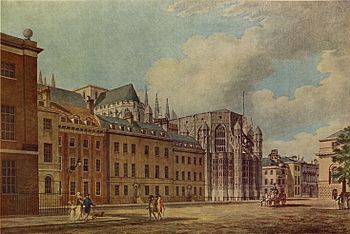Treaty of Westminster (1654)

Old Palace Yard, Westminster Palace, by Thomas Malton
|
|
| Type | Peace treaty |
|---|---|
| Signed | 5/15 April 1654 |
| Location | Westminster |
| Sealed | 19/29 April 1654 |
| Effective | 19/29 April 1654 |
| Expiration | 1660 |
| Signatories | Lord Protector Oliver Cromwell, States General of the Netherlands |
| Language | Latin |
The Treaty of Westminster, concluded between the Lord Protector of the English Commonwealth, Oliver Cromwell, and the States General of the United Netherlands, was signed on 5/15 April 1654. The treaty ended the First Anglo-Dutch War (1652-1654). The treaty is otherwise notable because it is one of the first treaties implementing international arbitration as a method of conflict resolution in early modern times. A secret clause, obliging the States of Holland to enact the Act of Seclusion, played an important part in Dutch internal politics during the First Stadtholderless Period.
The negotiation of the treaty started long before the war. The Commonwealth of England had been established only in 1649, and the new state was seeking international recognition. Older established states, like the Dutch Republic, looked somewhat askance at the "upstart," which also was ruled by "king killers." The Dutch Republic had actively supported the royalist cause in the English Civil War because of the family ties between the stadtholder William II, Prince of Orange and the English royal family, and his death in 1650, a new States Party regime had come to power in the Dutch Republic was necessary for a thaw in Anglo-Dutch diplomatic relations more feasible.
The negotiations about better relations started in earnest in the Spring of 1651. Walter Strickland and Oliver St John went to The Hague to talk about the removal of the royalist exiles who had sought asylum in the Netherlands (among whom the pretender Charles Stuart) from the Republic but more importantly about a political union between the two states, on the ground that they were similar in respect of politics, religion, and commerce. The Dutch government replied with a number of counter-proposals in matters they held dear, like principles of (then-emerging) international law, such as freedom of the seas, limitation of the concept of contraband to "instruments of war," freedom from capture of neutral goods on neutral ships in time of war (all matters that the English at the time disputed). Furthermore, the Dutch asked that letters of reprisal (a common practical cause of friction between states) should not be granted in peacetime. Finally, they asked that Dutch merchants should have the same privileges as English ones in English dominions in Europe and the Americas. The demands, collected in 36 draft-articles, were presented to the English ambassadors on 14/24 June 1651. They returned to England without an agreement having been reached.
...
Wikipedia
